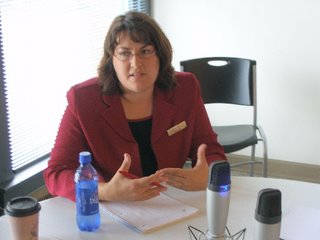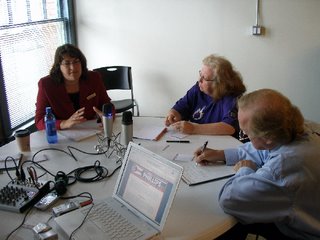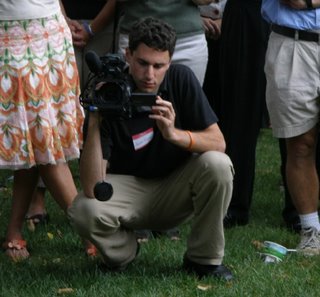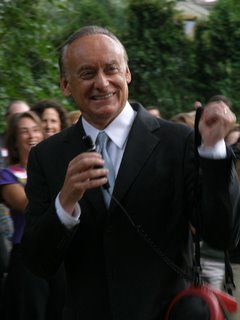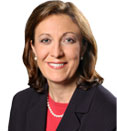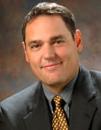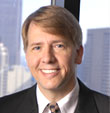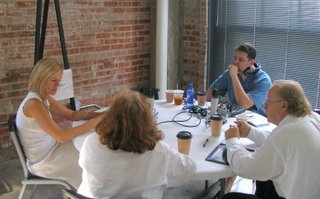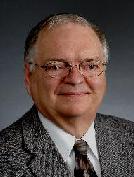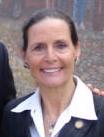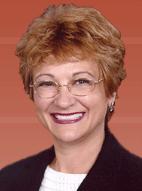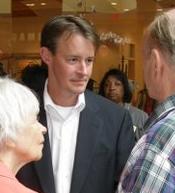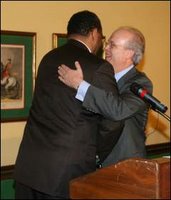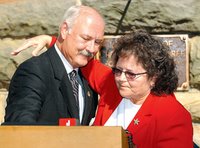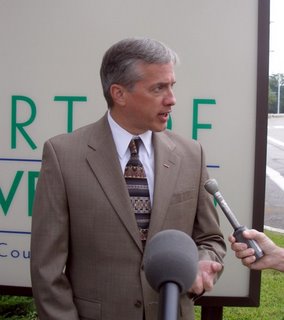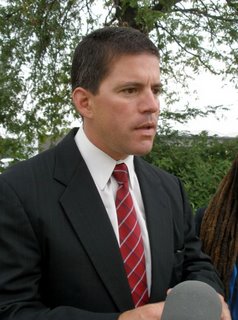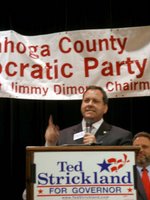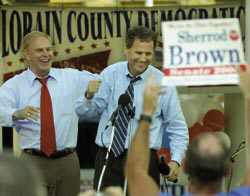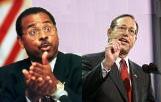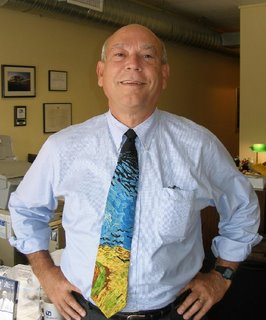
Last Wednesday I went to Celeste & Associates, a real estate firm situated in a storefront on West First Avenue in the Columbus suburb of Grandview, to interview 24th Ohio House District candidate
Ted Celeste (D-Grandview). We sat in a conference room that serves as a temporary campaign office (until the opening this week of larger quarters across the street). Celeste agreed to my recording our talk, which stretched out to about forty minutes despite the early arrival of his next appointment. It was a wide-ranging, frank, and totally fascinating conversation with a man who has a very long record of public service and an insider's perspective on Ohio politics over the last three or four decades.
Celeste was raised in Lakewood, Ohio, where his father was Lakewood Mayor for eight years and later ran for Cleveland Mayor and Ohio Attorney General. His brother Richard F. Celeste served four years each as a State Representative and Ohio Lieutenant Governor, then was Governor from 1983 to 1990 and U.S. Ambassador to India from 1997 to 2001.
Celeste graduated from Wooster College with a degree in psychology and studied education at the University of Hawaii and the University of Akron. He and wife Bobbie, a counseling psychologist, taught in the South Pacific in the Peace Corps. Celeste was later a high level official in the Ohio Department of Public Welfare and the Ohio Department of Finance. He played an important role in Jimmy Carter’s 1976 campaign for the presidency, running his Ohio primary campaign, managing his field desk for Ohio, Pennsylvania and New Jersey in the general election, and serving on his transition team. Celeste also ran his brother’s campaign for attorney general and first campaign for governor. In 2000 he ran for U.S. Senate against Mike DeWine (R-Cedarville).
Celeste has been a business entrepreneur in central Ohio for the last 25 years. He founded Advanced Interactive Video, Inc., an electronic marketing and promotions company, and Celeste & Associates Real Estate, Inc. He has been president of the Cleveland development firm National Housing Corporation, urban redeveloper New Town Housing, and the Columbus Magic Soccer Team. He was a trustee of The Ohio State University for nine years, including two as Chairman of the Board of Trustees, where he helped create the Science and Technology Campus. He and Bobbie are active members of the First Community Church.
The full text of my interview with Ted Celeste in Acrobat (.pdf) format is
here. A summary follows.
Celeste told me that his role model as a public official is Jimmy Carter, because Carter is a "very caring, honest" person whose "faith is important to him, but important not for how he talks about it, but what he does. It isn't creed, it's deed." Unfortunately for Carter, "times were tough when he was president," but "he's probably the best former president that we've ever had." Mentioning Carter's faith led to a discussion of Celeste's role in developing at First Community Church the new course "Faith and American Politics," an eight-session seminar with supporting CDs that draws on the thinking of
Scott Peck, M.D., author of "The Road Less Traveled," and
Jim Wallis, founder of the
Sojourners magazine and author of "God's Politics: Why the Right Gets It Wrong and the Left Doesn't Get It." The course deals with issues relating to the separation of church and how to "live out your faith as it relates to those things that are really important to you," and is intended to "increase our ability to speak with civility about our religious and political beliefs." Celeste was initially unsure if he could co-teach the inaugural course this past spring while running for office, but he said "not only did I do it, I got a lot of energy from it."
When I asked what motivates Celeste toward public service, he said that his faith is "a big part of it," especially now, but public service was "a part of our life" when he was growing up. His father, a mayor when Celeste was in fourth grade, talked about the importance of public service constantly at the breakfast and dinner table, and his mother was involved in public service as a social worker. Because he was "introduced to it early on," public service was always high on Celeste's "priority list." For Celeste the question is "interesting, because it’s a perspective you have and you assume everybody considers public service is important, but they don't."
From his long political perspective, Celeste says that the political landscape in 2006 is very similar to 1970, when John J. Gilligan was running for governor, there was a
major scandal among the Republicans, and the Democrats took most of the statewide offices and made big gains in the Ohio House and Senate. The Democrats didn't win outright control of either legislative chamber in 1970, but did in subsequent elections:
So, the basis for the pendulum swing was there, and it was started by scandals, it was started by all the bad stuff going on, so the atmosphere is very similar to that. Now you add to it, not only do you have all the scandals and the problems statewide, you have all the perception of problems nationally as well. So you add those two together, and it’s looking very good for the Democrats.
Celeste has knocked on about three thousand doors in his campaign so far. He says that the top three issues for voters are education, jobs, and health care. To a lesser extent, voters talk about immigration ("because the other side's talking about it") and the environment (perhaps "a bit of a result of Gore's movie coming out"). As to education, "the biggest thing people talk about is the property taxes, and the fact that they’ve had to rely on local residential property taxes too much, and the state hasn’t really met its constitutional responsibility to provide the dollars for that." Beyond the property taxes aspect, the education issue relates to "why is education is so important?":
Primary and secondary is important because you want kids to be prepared for jobs who might not go on to college, as well as be prepared for college and university so that they can carry on and be successful in the business world afterward, and be competitive, and we can keep people here. That’s the other piece of it, so it’s a continuum.
Celeste's district is largely suburban, with urban areas as well, and it includes the western part of the OSU campus. Due to the presence of university professors, says Celeste, it is the highest-educated district in the state. It is also a swing district, having gone for Kerry in 2004 while incumbent Rep. Geoff Smith (R) was winning with 56.35% of the vote over independent candidate Pat Byrne. Celeste said that his early polling showed that most residents did know who their state representative is, and that Celeste has higher name recognition (and positive recognition) than the incumbent. Ted Strickland is "doing really well" in the district, so Celeste jokes that his message is "Be sure to vote from Ted to Ted." Celeste expects that his campaign advertising will consist of things like suburban newspaper ads and direct mail rather than television, although if his opponent comes out with negative TV advertising then Celeste will respond on TV.
On having run for the U.S. Senate before running for the state legislature, Celeste acknowledges that people "usually do it the other way around" but said it was a "good experience" and he's glad he did it. However, a statehouse district is "much more doable" as far as speaking to the voters, which has "a big impact." Celeste thinks that in the present circumstances the Democrats "may be surprising some people" by retaking the Ohio House or Senate, but assuming that doesn't happen he still believes the Democrats will "have enough numbers" to promote "a bipartisan effort for solutions," particularly if there is a Democratic governor:
By [the Democrats] having the leadership of the author of a lot of the change that’s going to happen, [the Republicans] are going to have to respond to what’s coming out of the governor’s office, and there will be legislators who carry that legislation, so there’s opportunities to have a much bigger role, by having that office. So, I’d say, you’re not shut out, which is really what’s going on now.
As far as Celeste's personal priority list as a legislator, he mentioned mental health parity in insurance coverage ("my opponent’s the head of the insurance committee and he’s one of the people who’s kept it from passing"), and that he would "like to be involved in coming up with an education funding solution." The latter will require getting all the stakeholders together and getting them to agree. Here Celeste made the startling comment that he was "a bit disappointed that the TEL amendment wasn’t on the ballot" because opposition to TEL was having the effect of building the kind of coalition that is needed to address the school funding crisis. The solution will need to be fair, balanced between rural and urban districts, and must get rid of the over-reliance on propetry taxes. The biggest thing is getting "the priority from the state to commit the dollars that are needed in each of the school districts that will move the balance away from the reliance on the property taxes," and then "finding out what is the right number" to educate our kids, not "start[ing] every year looking at what was the number last year." However, Celeste doesn't support the idea of doing a new study to determine the cost of education because "I think there’s enough studies that have been done, I think we need to review the studies and then move to the next step."
There will be a featured fundraiser for Ted Celeste on Tuesday, August 29th, from 7:00 to 9:00 pm, at the home of Cy and Barbara Sokol. It will be co-sponsored by the Sokols, the Upper Arlington Progressives, and the Stonewall Democrats. For more information, send an email to dora-at-tedceleste-dot-com. Also, the official opening of the new Celeste for State Representative Headquarters will be held on Thursday, August 31st, at 7:30 pm at 1627 West 1st Avenue in Grandview.
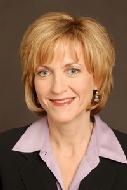 Craig Miller, Safety-Service director in the administration of Lorain mayor and congressional candidate Craig Foltin (R-Lorain), was found guilty of obstruction of justice for lying to Lorain police. When the guilty verdict was announced, Betty Sutton (D-Copley) released the following statement:
Craig Miller, Safety-Service director in the administration of Lorain mayor and congressional candidate Craig Foltin (R-Lorain), was found guilty of obstruction of justice for lying to Lorain police. When the guilty verdict was announced, Betty Sutton (D-Copley) released the following statement: